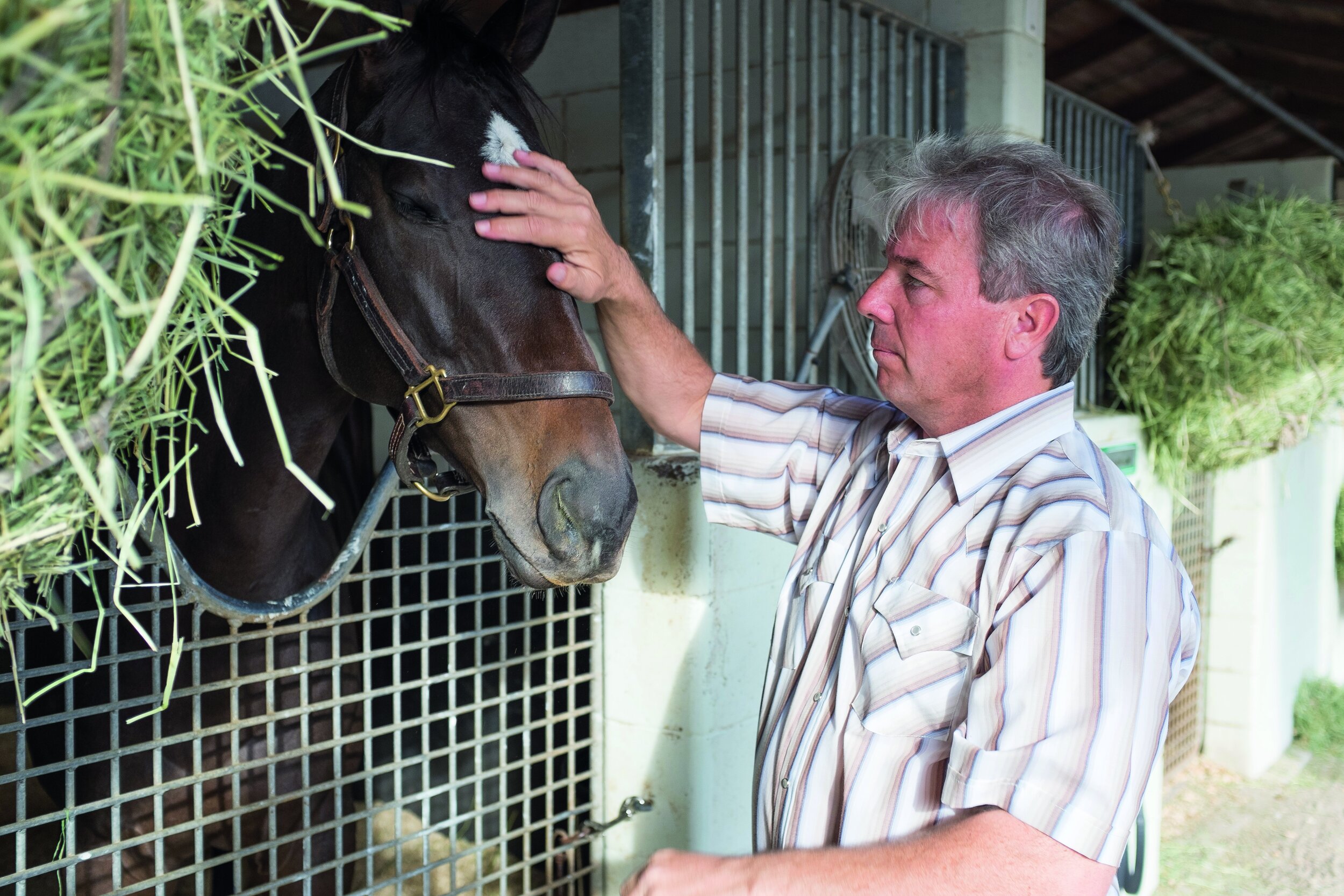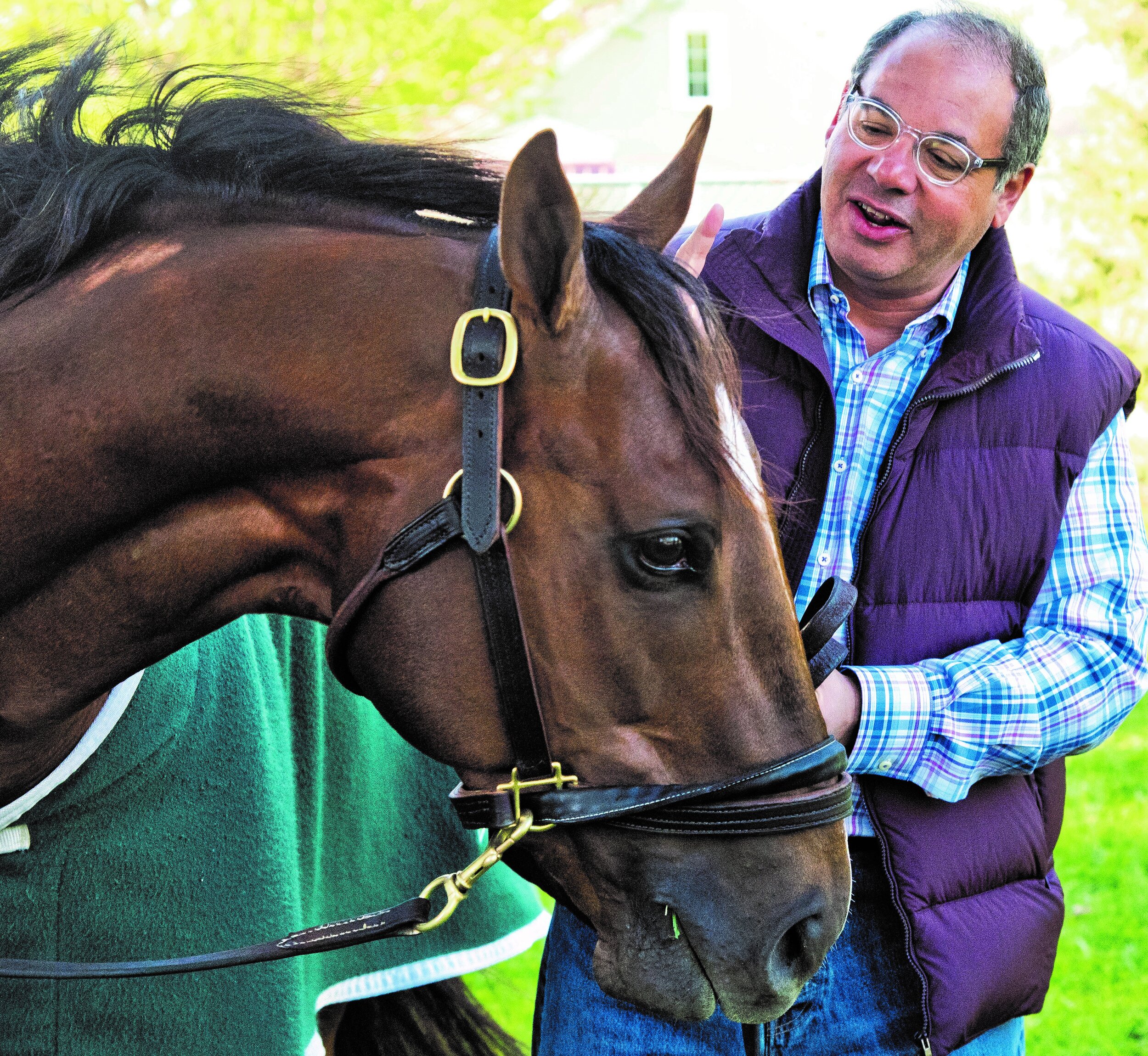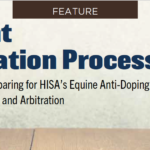Recent lawsuits are shining a light on one of Thoroughbred racing’s ongoing problems: owners who do not pay their bills. Trainers often top the list of those who get stiffed. What can you do to protect your business and help ensure you are paid for your services? And what are your options when a client does not pay?
A trainer’s dream
Growing up on a farm in Indiana, Frank seemed to have been born with a knack for horses. By his mid-twenties, he had begun training Thoroughbreds and was looking for clients he could build a business on. Walter, an investment banker from Indianapolis who loves racing, purchased a promising Thoroughbred named Rocketastic and needed a trainer. Walter had heard good things about Frank, and after watching “the kid” work with a horse at the track, a deal was struck.
Frank agreed to train Rocketastic for $100 a day, or $3,000 a month. This amount included the cost of feeding and stabling the horse in Frank’s small barn. The men shook hands, and Frank trailered the horse home. Rocketastic chalked up impressive fractions and earned his gate card. Official works were logged and approved. The owner and trainer agreed that three or four starts during the two-year-old season seemed reasonable. Walter mailed Frank a check at the end of every month to pay for training and expenses during the previous 30 days.
Rocketastic had the makings of a real contender. But early in the season, the horse suffered disappointing starts. Adding to Frank and Walter’s frustrations, the local racing secretary repeatedly wrote races that kept Rocketastic off the track on race day
The money stops
Frank was confident it would all work out. But by late August, he had not received payment for his work in July. Frank felt certain this was an oversight on Walter’s part. After all, he and Walter shared a good working relationship and a common goal. Frank understood that Rocketastic was not earning his keep, but Walter appeared to have plenty of money to cover costs. The owner was well dressed, sported a Rolex watch and drove a Porsche. He lived in a beautiful home in a gated community, and his children attended expensive private schools.
When Frank called Walter about the lack of payment, the owner assured him that a check was already on the way. Frank continued to train Rocketastic, but by mid-September, neither the July nor the August payments had arrived. Frank again called Walter, who insisted there must be a problem with the mail. Frank grew skeptical after his local postmaster told him there had been no complaints of lost or stolen mail. Soon Frank’s calls to his client went unanswered and unreturned. Voicemails, emails and texts were ignored as well.
Still, Frank was reluctant to give up on a promising horse, or the promises of its owner. By early November, Walter owed him over $13,000 in back pay and expenses. The lack of cashflow put tremendous stress on Frank’s business and his marriage. He did not know what to do or where to turn.
A recurring problem
The situation I have described is hypothetical, but it is based on numerous real-life complaints that I have heard from clients and potential clients. The fact that some owners do not pay their bills is a serious industry issue. It is known all too well by many who work in the industry. Anyone who thinks this is simply the result of trainers who lack business sense working with owners who lack horse sense should think again. Recently, the racing press has been filled with articles covering cases currently winding their way through the courts. Details vary, but the bottom line is the same: Trainers are not getting paid for their work.
In this article, I will review high-profile cases and offer some pointers to help you avoid payment problems. I will also explore the options available when a client is unwilling to pay.
The Ramsey lawsuits
In March of this year, owner/breeders Ken and Sarah Ramsey were hit with back-to-back lawsuits. Each was filed on behalf of a trainer who claimed to be owed nearly $1 million in unpaid bills. The Ramseys are well-known Thoroughbred breeders and owners, with an impressive string of victories and a shelf full of Eclipse Awards to show for their efforts.
Yet trainer Mike Maker’s suit alleged that the Ramseys had been behind on their training bills for years and owed him over $900,000. Another trainer, Wesley Ward, claimed the Ramseys owed him over $970,000 in unpaid bills, percentages of winnings and accumulated interest. Like Maker, Ward acknowledged that the Ramseys had paid some of their tab but alleged that the balance due had been in the high six figures for months and continued to grow.
Initially, it appeared these matters would be resolved out of court. Ken Ramsey told reporters that he had some cash flow problems but intended to pay both trainers. Unfortunately, Mike Maker’s legal team was back in court in July, claiming that the Ramseys failed to meet the agreed-upon payment schedule. In early August, Wesley Ward’s attorneys filed for summary judgement, stating that all payments from the Ramseys had ceased.

WESLEY WARD IS ANOTHER TRAINER TO SUE THE RAMSEYS THIS YEAR FOR ALLEGEDLY FAILING TO PAY BOARD AND TRAINING BILLS
The Ramseys’ response revealed a major change in strategy. BloodHorse.com reported that the Ramseys’ new filing stated that there was no written agreement between Ward and the Ramseys on a day rate, what horses a rate should be applied to, or terms of payment. The filing also claimed that Ward had refused the Ramseys’ request to return 30 of their horses, and argued a potential lien on the animals would conflict with other statutes governing lawsuits in Kentucky. The filing also requested time to prepare a countersuit against Ward. As of this writing, it appears that all parties involved in both suits could be facing long, complicated legal battles.
Zayat’s legal woes
Meanwhile, a painful example of a long, complicated Thoroughbred legal battle continues to play out in the courts. At its center is Egyptian-born, Triple-Crown-winning owner Ahmed Zayat. Zayat, who founded and operated Zayat Stables, is the kind of larger-than-life character that racing enthusiasts love. Or love to hate. In 2015, the year American Pharaoh delivered Zayat Stables’ Triple Crown and Breeders’ Cup triumphs, Joe Drape of The New York Times described Ahmed Zayat as “flamboyant” and “controversial.”
Zayat made his fortune when his investment group bought, modernized and sold an Egyptian beverage company. He then set out to build a world-class Thoroughbred operation. Zayat spent big and enjoyed major successes, but he was sued by Fifth Third Bank in 2009 over an alleged $34 million in unpaid loans. He filed a countersuit, claiming the bank had engaged in predatory lending practices. Zayat Stables filed for Chapter 11 bankruptcy, allowing the company to continue doing business while attempting to deal with its debts. Legal proceedings soon revealed that Zayat owed significant sums to a number of creditors, including a total of $148,798 to trainers.

AHMED ZAYAT AND MR Z AT CHURCHILL DOWNS 2015
Zayat Stables eventually came to terms with its creditors, including Fifth Third Bank. It emerged from bankruptcy and rode to glory with American Pharoah, among others. Then, in January 2020, history repeated. MGG Investments filed a lawsuit against Zayat Stables and Zayat family members, alleging the Thoroughbred operation had failed to pay back $23 million of a $30-million loan. Zayat filed a countersuit, alleging he was the victim of a predatory lender acting in bad faith, as he had done in 2015.
Accusations and allegations fly
Zayat’s ongoing legal struggles have taken many twists and turns, but I will do my best to summarize. MGG expanded its lawsuit, alleging that Zayat had conspired with family members and others to hide money and distort the value of assets, including horses and breeding rights. MGG also claimed that Zayat had sold assets that were to serve as collateral for its loan. A judge appointed a receiver to take control of Zayat Stables’ finances. Court proceedings again revealed a long list of unpaid bills, and some of Zayat’s many creditors filed legal actions of their own.
In June 2020, a Kentucky judge ruled that Zayat owed MGG some $24.5 million in loan payments and interest, and dismissed many elements of Zayat’s countersuit. The judge also dismissed MGG’s claims against industry professionals who had done deals with Zayat Stables, but ruled that MGG could move forward with a fraud claim against Zayat. Ahmed Zayat filed Chapter 7 bankruptcy in September 2020. Most of his company’s assets, including Thoroughbreds, were auctioned off by the end of the year. This summer, Zayat’s bankruptcy attorney asked to be allowed to withdraw from the proceedings, claiming his client had racked up nearly $370,000 in unpaid legal bills.
Zayat Stables’ legal problems also revealed that the operation had run up a total of over $1.5 million in debts to a who’s who of Thoroughbred trainers, including Bob Baffert, Brad Cox, Mike Maker, Richard Baltas, Steve Asmussen, Todd Pletcher and Rudy Rodriquez.
An ounce of prevention?
As these events attest, there is no foolproof way to determine whether a client will pay a trainer. But there are some things you can do to protect yourself. Ideally, a trainer and an owner would sign a written contract detailing their arrangement, including the number of horses to be trained, the trainer’s day rate, terms of payment, etc. Written contracts benefit and protect both service providers and their clients, and are accepted as routine in most industries. Horse racing, however, is a notable exception.
Andrew Mollica has worked as racing official, broadcaster and an agent for top jockeys, among other things. In his forties, Mollica returned to college to earn a law degree. Based in New York, he currently practices law, with an emphasis on equine law. Mentioning contracts to Mollica draws a quick response. “I’ve worked in racing for nearly 45 years,” Mollica says, “and I’ve never seen one—not any kind of written agreement between an owner and a trainer. They don’t seem to exist!”
Mollica’s not sure what an owner would do if a trainer asked for a written contract, or vice versa. Not that he thinks many would. “American Thoroughbred racing is a 21st-century industry run like an 18th-century enterprise. So much is done on handshake deals. Good or bad, that’s the way it is,” he says.
As an equine attorney and Thoroughbred owner myself, I know that suggesting you create a simple contract for your services and ask your clients to sign it may cause you to roll your eyes in disbelief. But it is still a good idea. Contracts can be awkward to ask for upfront, but they make all the difference when things go wrong. That is why the phrase “get it in writing” remains a business staple.
If you do not have a contract, consider sending a follow-up letter or email to your client that outlines your understanding of the terms of your verbal agreement. If the owner thinks you have misunderstood the deal, he or she will likely respond regarding the areas in question. If there are differences, once those differences are resolved, I suggest sending an additional letter or email that documents exactly the agreed upon terms.
The upfront approach
Of course, you should always keep accurate records of your working hours and expenses. You should also consider requesting to be paid upfront. In the event you are training horses on a monthly payment schedule, request payment. If payment problems arise, you will know from the get-go. If you are not comfortable requesting the full amount in advance, consider requesting expenses for care and feeding. That can go a long way towards a solid cash flow.
If you are concerned about entering a business relationship with an individual, you may conduct an online background check. Many reliable companies provide this service at a reasonable price, including Intelius, TruthFinder, BeenVerified, and others. A standard “people search” will typically review public records from the last seven years, should report any bankruptcies or criminal convictions, and does not require you to obtain permission of the person in question under current U.S. law.
You may also consider conducting a credit check online. But be aware that credit checks are governed by strict federal regulations, as well as applicable state laws. In the United States, you must obtain written permission from the individual whose credit report you are requesting, among other requirements. You cannot legally conduct a “secret” credit check.
Remedies for unpaid bills
In the event the client/owner refuses to pay, what are your options? When this happens, act sooner rather than later, and document your communications with the client regarding the matter. Keep a written phone log listing calls and texts, save all emails, and keep copies of anything sent by mail. Once you have made a reasonable effort to get paid, contact an attorney, preferably one with equine experience.
Every case is different, but here are some likely scenarios. Your attorney will contact the client, requesting the debt be paid to avoid legal proceedings. This alone may result in payment. Or it may result in acknowledgment of the monies owed and a negotiated payment schedule. If you are in possession of the horse (or horses), you will have to continue caring for and feeding the animal(s). Though this will increase the amount of expenses you are owed, you cannot simply neglect the horse. However, whether or not you continue to train the horse is your decision, and I suggest you make that decision with the help of your attorney.
Lawyers, liens and money
If the owner refuses to make a good-faith effort to resolve the matter, and the horse is in your possession, your attorney will likely file for a lien. This powerful legal tool allows you to retain the horse as collateral until the debt is paid and retain or sell the horse if it is not. The specific term for this type of lien varies from state to state. It is commonly known as an agister’s lien, a stableman’s lien or a liveryman’s lien. The rules and regulations governing these liens vary by state, and it is important that you work with an experienced attorney when attempting to attain such a lien.
Obtaining an agister’s lien is a multi-step process. “If the horse is in your possession, and it’s worth more than the debt, you will get paid,” Andrew Mollica says. “But you have to follow the process.”
American Revolutionary War hero James Lawrence shouted, “Don’t give up the ship!” when the British attempted to board his vessel. “Don’t give up the horse!” is Andrew Mollica’s remarkably similar battle cry for trainers dealing with unpaid bills. Good advice, because in most states, if you return the animal to the owner or turn it over to officials, you may surrender your right to obtain or enforce an agister’s lien. If you are pressured to return the animal by anyone, inform them that you are in the process of obtaining a legal lien and have the right to retain the animal until the lien is issued.
Many owners pay up when they learn of lien or possible auction. “They suddenly realize you’re serious and act accordingly,” Mollica notes. What if they still refuse to pay? If you auction the horse, in most states, you are entitled to what you are owed, plus legal expenses, including the cost of obtaining the lien, as well as the auction costs incurred. If the horse sells for more than what you are owed plus expenses, you are not entitled to keep the difference. You must send that money to the owner who hired you—no matter how much you resent them. If the horse sells for less than you are owed, you may pursue the remaining debt in court.
The bankrupt owner
Finally, if an owner who owes you money declares bankruptcy, hire an experienced attorney to file an official claim on your behalf with the bankruptcy court. The court will ultimately decide which creditors get paid how much and when. Filing a claim will not guarantee that you get paid the full amount you are owed. In fact, it will not guarantee that you get paid at all. However, failing to file a claim pretty much guarantees that you end up with nothing.
No trainer, no matter how skilled or successful, is infallible when it comes to sizing up which clients will pay their bills. Hopefully, these examples and recommendations will assist you in avoiding unpaid invoices, and help you obtain the money you are owed if payday ever turns to “someday.’






